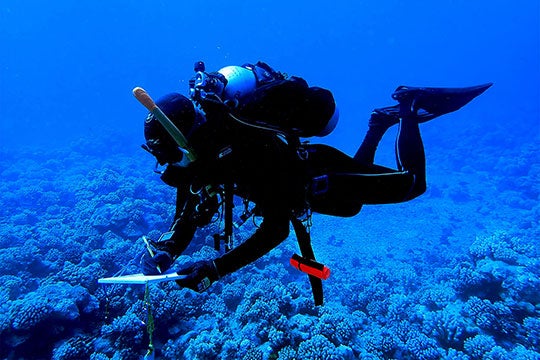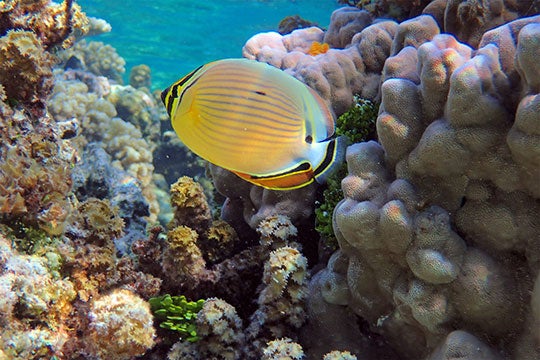HOUSTON – (March 28, 2022) – Rice University marine biologist Adrienne Correa has won a prestigious CAREER Award from the National Science Foundation to follow up her lab’s 2021 discovery that coral predators could play an important role in maintaining the health of coral reefs.

The award comes as a marine heat wave at Australia’s Great Barrier Reef is causing widespread coral bleaching, a stress response in which corals expel their symbiotic tenants, the algae that give them color and help feed them. This is the fourth mass bleaching event on the Great Barrier Reef in the past seven years, and bleaching events worldwide are increasing in frequency and severity. Bleaching degrades coral reefs, and Correa’s lab is looking for factors that may limit or reverse this damage.
In a surprising twist on coral reef symbiosis, Correa and her students discovered the feces of coral-eating fish are highly concentrated with living microorganisms that are essential for coral health, and the activities of these fish could help baby corals develop and potentially help reefs respond to climate change.
“What we're really trying to figure out, zoomed out to 50,000 feet, is ‘do the feces of coral-eating fishes help corals survive?’” said Correa, an assistant professor in Rice’s Department of Biosciences.
CAREER Awards are highly competitive and include a five-year grant, this one for $982,000, to support early-career faculty who have the potential to serve as academic role models and leaders in research and education. NSF began issuing the awards in 1995 and gives only about 500 each year across all disciplines. Correa’s is Rice’s 100th CAREER Award and the 10th of 2022, the most the university has received in one year.
The symbiotic relationship between corals and dinoflagellate algae is central to Correa’s CAREER research. Each coral can potentially host multiple dinoflagellate species, and Correa’s lab and others have shown that symbiont diversity can help corals survive stressful conditions like those associated with ocean warming.
About half of corals obtain their algal partners from their environment, rather than being born with them. Enter coral-eating fish, who gather millions of symbionts per bite. Despite the damage those bites inflict on individual corals, their overall effect on reef health could be positive. To avoid being eaten by larger fish, coral predators dart from coral to coral between bites, and that constant movement could help them deliver concentrated packets of live symbionts each time they drop a pellet of poop.

“If we find out that coral-eating fish feces are beneficial for corals, in terms of maintaining this symbiotic partnership, then we can start leveraging that information to mitigate damages to reefs,” Correa said. “For example, we could try to put extra coral-eating fish out on reefs to spread symbionts helpful to corals. This research could also give us a better understanding of how corals use the microbial probiotic solutions that researchers are now testing.”
Correa’s lab will test these ideas in experiments at Rice and at the Mo'orea Coral Reef Long-term Ecological Research station in French Polynesia.
“Every day, adult corals are taking in some symbionts and spitting out others,” she said. “And sometimes the symbionts they expel are healthy and in good shape; other times, they’re not. So one of the questions is ‘How important are the symbionts from fish feces, compared to those released by corals?’”
In some conditions, the symbionts from feces might be more important for coral uptake and survival than symbionts spewed out by other adult corals, and Correa’s newly funded research is designed to tease apart those conditions.
For instance, Correa and her team want to know if symbionts in coral-predator feces can help reefs recover from bleaching.
A number of studies have shown that some species of symbionts are better able to tolerate warming ocean conditions. Correa said many aspects of bleaching aren’t well understood, but there’s some evidence that corals are more likely to expel unhealthy symbionts that are struggling to survive.
“During bleaching conditions, some coral-eating fishes have been observed to focus their feeding on corals that are not bleached,” Correa said. “It’s possible that these fishes are gathering and distributing symbionts that have some beneficial heat-stress adaptations or are at least more healthy. Not every coral can work with every kind of symbiont, however, so although coral-eating fish activity may be shown to help corals survive stress, it won’t be sufficient to protect reefs from climate change.”

Her CAREER-funded research will test whether such feces from coral-eating fish help bleached corals survive and recover.
“We’ll compare the responses of corals that are exposed to both coral-eating fish feces and feces from fish that eat coral competitors as well as to experimental controls,” Correa said. “We’ll see if the coral-eating fish feces help corals get better faster or improve their chances of surviving.”
The educational component of her CAREER Award research is twofold. Each summer, her lab will host an environmental science teacher from Houston Independent School District who will help conduct research and use the experience to design classroom teaching modules. The grant also includes funds to support undergraduates from the Rice Emerging Scholars Program to work in the lab for multiple, consecutive years.
While the NSF grant doesn’t include funds for RESP students to travel to Mo’orea, Correa said she’d love to pursue other funding to try and make that happen if students are interested.
“The RESP students will really have a long-term, immersive experience in the lab, and I would be very excited to have them also come to the field,” she said. “Getting to go deep with their research experience will help them hone in on what they are passionate about scientifically, and show them they can achieve it.”
- Grant information
-
“CAREER: Testing the effects of predator-derived feces on host symbiont acquisition and health,” NSF Division of Ocean Sciences.
- Image downloads
-
https://news-network.rice.edu/news/files/2022/02/0214_CORREA-career-lg.jpg
CAPTION: Adrienne Correa, a marine biologist and assistant professor of biosciences at Rice University, won a National Science Foundation CAREER Award to follow up her lab’s 2021 discovery that coral predators may play a role in maintaining the health of coral reefs. (Photo by Brandon Marin/Rice University)https://news-network.rice.edu/news/files/2022/03/0214_CORREA-career-cg1-lg.jpeg
CAPTION: Rice University graduate student Carsten Grupstra taking notes while following coral predator fish in Mo'orea, French Polynesia, in October 2020. (Photo by Alex Veglia/Rice University)https://news-network.rice.edu/news/files/2022/03/0214_CORREA-career-chaetodon-lg.jpeg
CAPTION: Chaetodon lunulatus, a coral predator photographed in Mo'orea, French Polynesia, in October 2020. (Photo by Alex Veglia/Rice University) - Related links
-
Correa Research Group: www.owlnet.rice.edu/~ac53/index.html
BioSciences at Rice: biosciences.rice.edu
Wiess School of Natural Sciences: naturalsciences.rice.edu
Follow Rice News and Media Relations via Twitter @RiceUNews.
- About Rice
-
Located on a 300-acre forested campus in Houston, Rice University is consistently ranked among the nation’s top 20 universities by U.S. News & World Report. Rice has highly respected schools of Architecture, Business, Continuing Studies, Engineering, Humanities, Music, Natural Sciences and Social Sciences and is home to the Baker Institute for Public Policy. With 4,052 undergraduates and 3,484 graduate students, Rice’s undergraduate student-to-faculty ratio is just under 6-to-1. Its residential college system builds close-knit communities and lifelong friendships, just one reason why Rice is ranked No. 1 for lots of race/class interaction and No. 1 for quality of life by the Princeton Review. Rice is also rated as a best value among private universities by Kiplinger’s Personal Finance.

